 Library of Congress
Library of CongressOn May 4, 1864, the Overland Campaign commenced as the Army of the Potomac began its crossing of the Rapidan River at Germanna Ford, shown here in a photo by Timothy O’Sullivan.
From May 4 – June 24, 1864, the armies of Ulysses S. Grant and Robert E. Lee fought a series of bloody battles as a result of the latest Union advance into Virginia. Known to history as the Overland Campaign, this stretch of the war—one month, two weeks, and six days—resulted in between 80,000 and 90,000 total Union and Confederate casualties at battles including the Wilderness (May 5–7), Spotsylvania Court House (May 8–21), and Cold Harbor (May 31 – June 12). When it was over, the battered armies settled into positions outside Petersburg, a strategically important city that Grant’s army soon besieged.
Among the soldiers who fought in the battles of the Overland Campaign was John R. Pillings, a corporal in the 86th New York Infantry. Pillings—who, at 35, had enlisted in the army in July 1861 and reenlisted as a veteran in February 1864—wrote two detailed letters home chronicling the day-to-day struggles of the campaign, which are reprinted below. Pillings survived the campaign and the war, mustering out with his regiment at Washington, D.C., in June 1865.
Halted on the Peninsula, near the
Pamunkey River, May 29th, 1864.
Dear Friend — This is a splendid Sabbath morning. I will occupy my time in giving you a brief review of this campaign thus far. Perhaps you will say it is not right to write on such subjects on the Sabbath-day. Now, I ask which is the most right, to write a letter showing the mercy of God to me, or to idle away my time in useless regret?
May 3d. — On picket at Kelly’s Ford, Rapidan River. Weather fine and warm. The country all around smiles as the green garment is being spread over vegetation. At eight p.m. we drew in our picket, went back to camp (seven miles), and drew six days’ rations. At twelve the whole army took up its line of march for the Rapidan.
When we reached Fredericksburg plank-road, we threw up some logs for breastworks, firing in front. Moved by the right of companies, the front into column, and advanced through some underbrush. Soon the balls whistled over our heads, and we were about to engage the enemy. There was one brigade of ours then fighting them; and we had not yet come into line of battle, but were by the right of companies to the front, and so close together, that when the order was given we could not get into line. Then I saw at once if we were attacked we would break and run. Soon after, all was confusion. The brigade in front was overpowered, and ran through our imperfect line, which made our line worse than it was before, if such a thing were possible. Soon the rebels advanced; we fired about eight rounds; then the left centre gave way, and all ran for the breastworks; passed in our turn through the First division of the old Third corps, and got behind our own breastworks. Soon the rebels came out, and were handsomely driven back.
May 6th. — As soon as it was light, our columns advanced and drove the Johnnies before us as nicely as you ever saw any thing done. About 11 a.m. the rebels turned our left flank, and again we had to fall back to our breastworks. The rest of the day was very quiet until about 4 p.m., when the rebels closed en masse, charged on our works, and of all the sounds of musketry ever known in history, there never was or could be any thing produced to equal the firing that continued for about one hour; it was just like a million drums beating one continual roll. About 5 our works caught fire on our left, and we had to fall back to our second line; the rebs came up as far as we had left, and then ran back for dear life, and the victory was ours. Such was the two days’ fight in the Wilderness, near Chancellorsville.
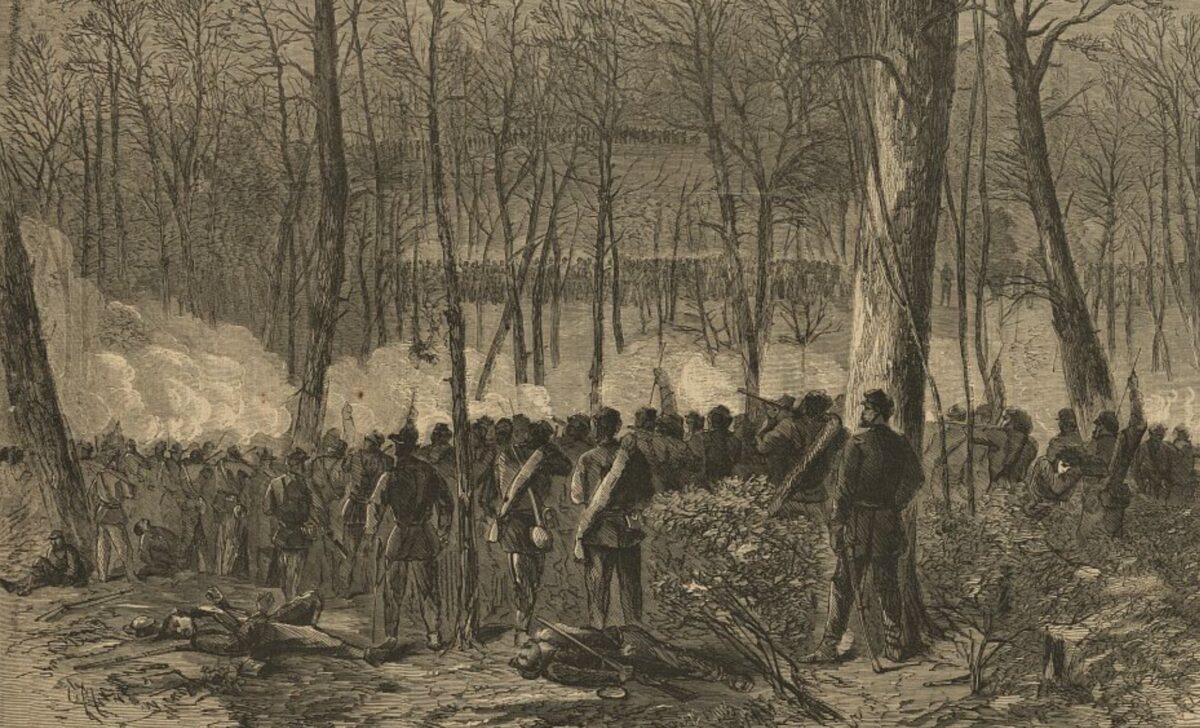 Library of Congress
Library of CongressUnion and Confederate troops exchange fire during the Battle of the Wilderness, fought May 5–7, 1864.
7th. — At 4 p.m., moved out by the right flank, crossed the plank-road, and went into works: soon, General Grant passed along the line: the enthusiasm was very great. A few moments later, General Mead went by, followed by a brigade of cavalry, then artillery, and as I laid me down the Sixth corps was passing.
8th. — Arose before the sun this morning; troops are still going by, and have been all night. At eight the last oi the corps passed. At 9 a.m. we move off to the left. At four heavy skirmishing in front. A detail from our brigade went out to cut off some rebel cavalry, but found it supported by infantry, and returned unsuccessful.
9th. — Early in the morning we were taken to the left, past Todd’s tavern; commenced building earthworks; finally put into earthworks already built; picket kept up a steady fire, so that we got no rest.
10th. — The Sixth corps had hard fighting all day. At 5 p.m., our division made a charge on the enemy’s stronghold, near Spottsylvania, but were unsuccessful, and ran back under a heavy fire of shot and shell. This is only an outline often days’ fighting, working, and hardships never before known in this army.
 Library of Congress
Library of CongressA postwar photo of Confederate entrenchments at Spotsylvania Court House.
June 1st. — Since I wrote the above, I have again been engaged with the enemy, and, through the mercy of God, am permitted to live, sound and well, to write a few more lines to you. Yesterday we had orders to move, and went out in front, charged on the enemy’s pits, and took his first line of intrenchments. We were stationed on the extreme left of the line, and the rebels had a flanking fire on us, killing and wounding our men at their leisure, until we dug a flanking pit, when we very soon dried them up. While I was digging, two balls hit me, one went through my knapsack, and the other hit the strap across my shoulder, but neither hurt me or scared me, for my trust is in God, and whatever may be His will, will be accomplished. Remember me in your prayers.
Yours as ever,
J.R. Pillings.
Army of the Potomac.
Bartlett’s Mill, Va., June 10th.
Again I seat myself to continue my sketch of this campaign. 11th May. — Moved to our position after the charge, and laid still behind breastworks all day. In the afternoon the Fifth corps came, and formed three lines of battle on the right of our brigade, as if to make a charge; but at four o’clock it began to rain, and at five they moved off by the right flank to their former position. At sundown we occupied a part of the Sixth corps’ intrenchments, and drew three days’ rations, and built breastworks all night.
May 12th. — Daylight: the whole field is covered with troops, closed en masse; there are two lines in advance of ours, which is the third line, and there is still another behind us, also a line of artillery as thick as it can be conveniently planted; surely this must mean something. Ah, we have not long to wait. There they go. It is a grand charge. The first line has advanced, the second followed; now it is our turn; steady boys, keep cool; forward now, remember who you are; double-quick, steady. Here we pass through the line which went in advance of us; the prisoners captured by the first line are being marched in by thousands. Now we are up to the breastworks (rebel), and the first attacking line. Now, excelsior; forward over the work; over we went; but by this time the rebels had awakened to their danger, and were well prepared to receive us with shot, shell, and canister, so we contented ourselves with bringing off one piece of artillery, and one rebel color. Thus was conducted one of the most brilliant, successful charges of this war. It was a complete surprise to them, and many were prisoners ere they had awoke from their sleep; many more would have been captured but for the second line cheering a little too soon; but, as it was, we took 6,000 prisoners, eighteen pieces of artillery, and thirty-two colors. All this was done before 8 a.m., and any of us had had a mouthful to eat. Now, as there was a lull, we put a few hard-tack out of the way.
Soon the rebels formed their troops again, and were determined to retake the works so lately taken from them. They charged time and again, but all in vain; our boys are not now to be intimidated by a few minie balls; they have the death of many brave comrades to avenge, and it seems as though, to a man, they are unmindful of personal danger.
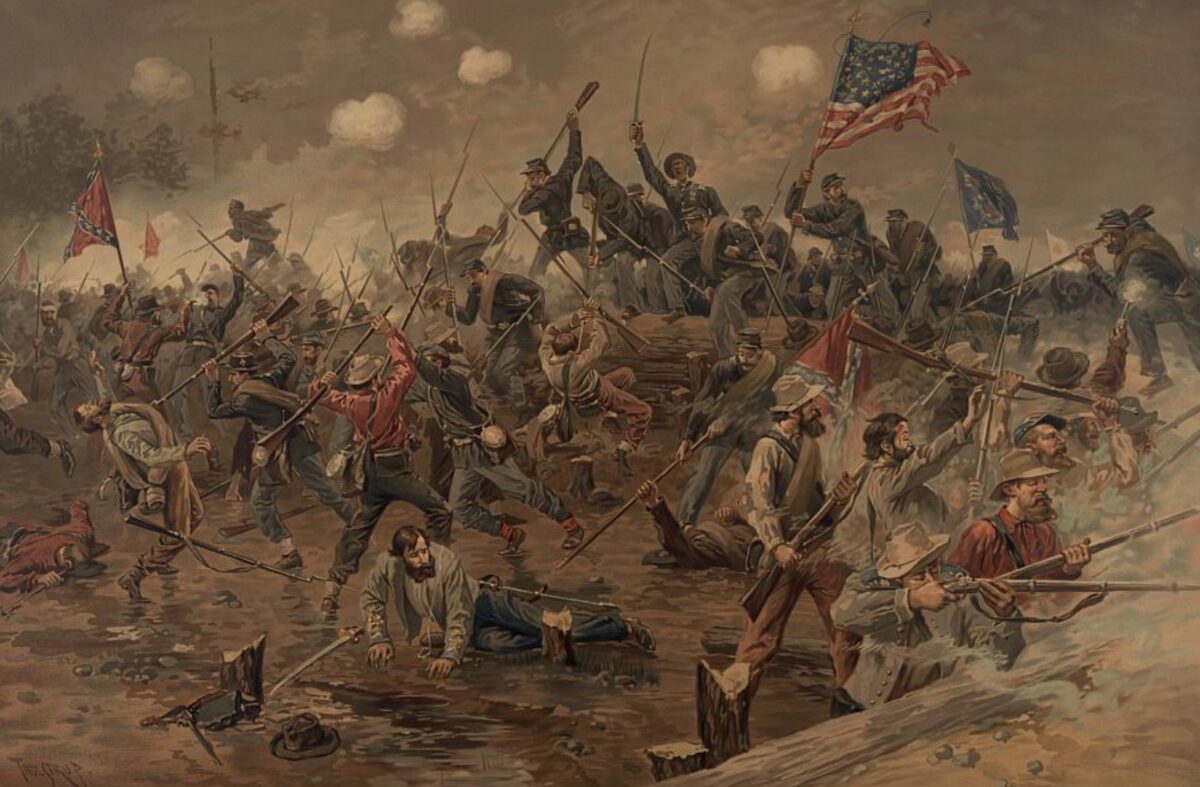 Library of Congress
Library of CongressThure de Thulstrup’s painting of the intense fighting at Spotsylvania Court House.
About noon, the rebels showed a flag of truce in front of our right, and our officers ordered us to cease firing, which order, after some delay, was reluctantly obeyed. They came up, and some said they wanted to come and give themselves up; we told them to come on: a few started, and the rest tired into us; this was more than we bargained for, and we gave it to them back with interest; but, with the aid of the “white flag,” they had managed to creep up to the other side of the works, and there we stood, their flag on one side and ours on the other, not more than ten feet apart, firing into one another as fast as we could. We kept up a steady fire all night, to prevent their getting over the works under cover of darkness. In the morning they were gone, but in a space of three rods they left over one hundred of their dead on the field. Such a sight I never saw.
May 14th.— Called up at three a.m., moved off to the right, and occupied the intrenchments we fought behind on the 12th. Rebel sharp-shooters busy all day, but do not accomplish much. At three p.m. moved still further to the right, and built strong breastworks. After work was done, I went out to review our position, and came back perfectly content to lay down and sleep, as safe as if I had been at home in my mother’s arms.
May 15th. — Moved and connected with Burnside’s forces on the left. Johnnies threw shell at us all day.
Mav 16th. — Moved further to the right into a dangerous pit; twelve men hurt yesterday: but felt that God was near me to protect me from harm.
May 18th. — At early dawn we were again in motion, perfectly at a loss to account for some moves, but have confidence in our leaders, and take everything as it comes; soon we filed right, and faced the enemy. Brisk fighting for about three hours. Twelve o’clock, midnight, took up
our line of march towards the left.
May 19th. — Marched until eight a. m. this morning. At last, we have come out of the Wilderness into as pretty a country as I ever saw.
May 20th. — Started for Simea Station, as wagon-guard. Marched twenty-five miles through a beautiful country; vegetation seemed to be in a prosperous condition.
May 22d. — Moved into intrenchments by the right flank; cut a road for artillery through the woods.
May 23d. — At six p.m. were within half a mile of the North Anna River; we charged and took a redoubt and some rifle-pits; got possession of the bridge (Taylor’s). My company were on picket at, the bridge all night, with orders to hold it at all hazards. The rebels tried to burn it several times, but we sent too many minie balls at them, and they left with their object unaccomplished. We held the bridge until four p.m. the next day, and then all our corps were on the other side, and there was no more need of our staying, so we rejoined our command.
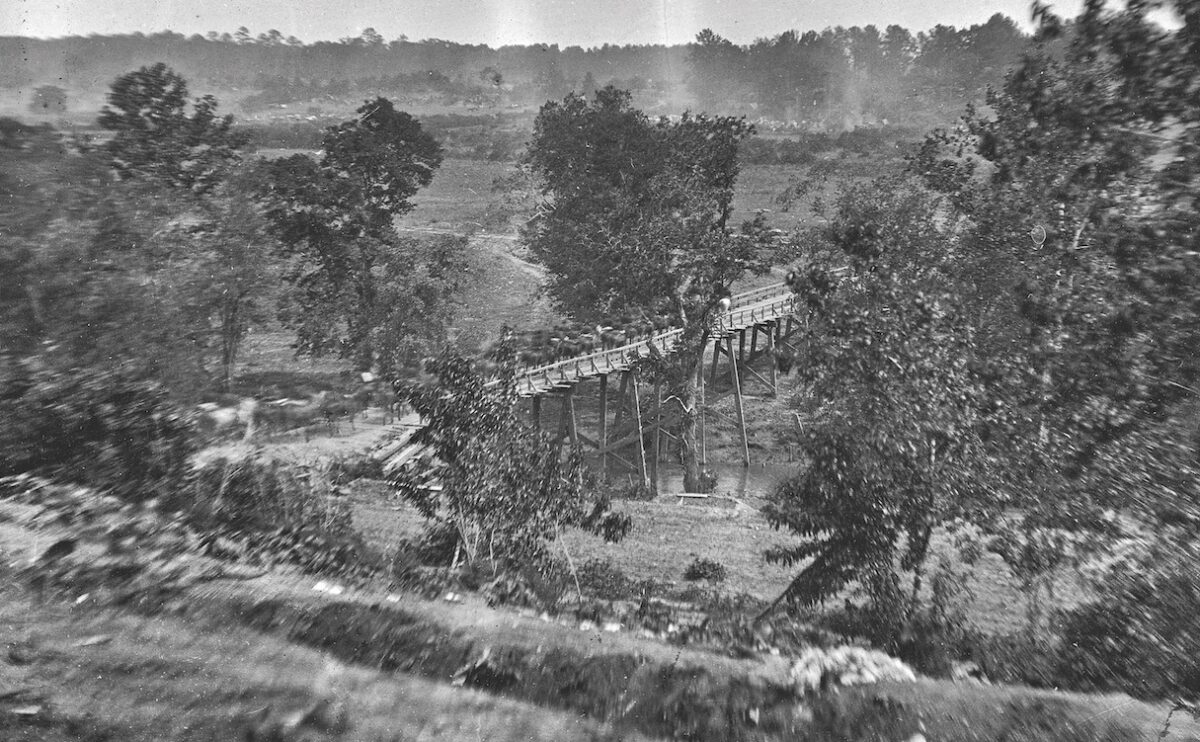 Library of Congress
Library of CongressGrant’s forces cross the Chesterfield Bridge over the North Anna River in pursuit of Lee’s army.
May 25th. — All quiet during the day; at seven p.m. we went out and built breastworks in front, and from that time till to-day, the 11th of June, we have been building works, having an occasional skirmish. Here we are, where McClellan was two years ago. I wonder if, on the 25th of this month, we will have another such move as he made: lot us wait and see what the future brings forth.
The last month has been one of particular trials and hardships, such as even this army never before endured, and through the whole God has been ever near and precious to me, and I can unfeignedly thank Him for His great goodness to one so unworthy of even His notice. Last night we had a very nice prayer-meeting; eight of us went out in front and enjoyed a pleasant hour in sweet communion with God; how pleasant it is to one’s soul, after a month of entire abstinence of gatherings together, or even seeing one another (to speak a word), to meet and lift up our hearts as one to the Ruler of all events of life! Oh that I may ever feel my dependance upon Him, so that if I am spared to return home, I can tell the world of his exceeding great goodness; or if it is His will that I see home no more, that I may be so prepared as to go home to my Saviour in heaven above!
Your loving
J.R. Pillings
Source
Soldiers’ Letters, from Camp, Battlefield and Prison (1865)

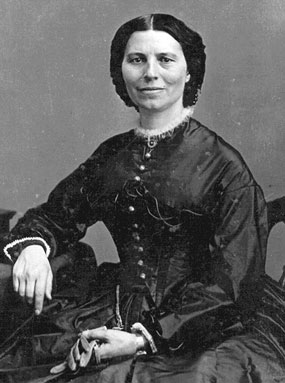
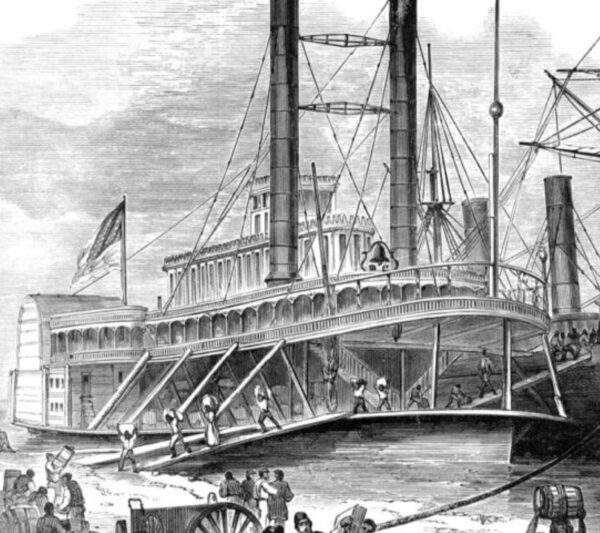
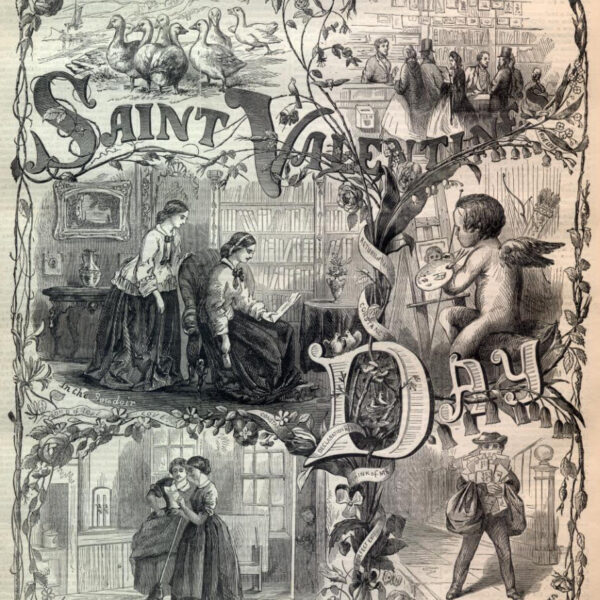
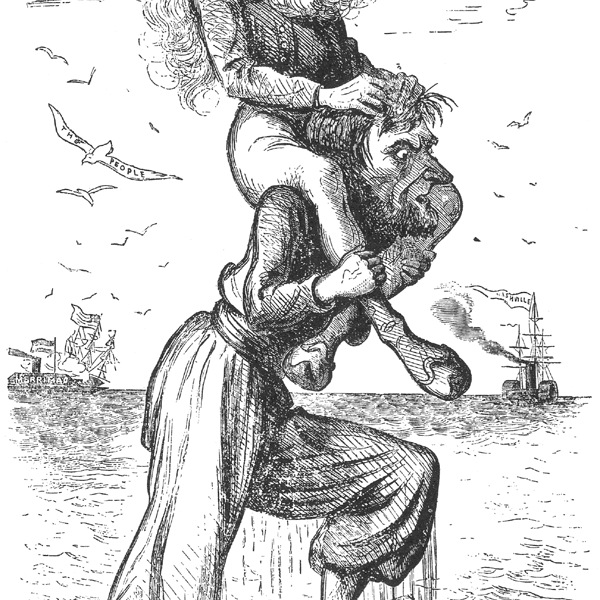
Excellent read. Lucky guy!